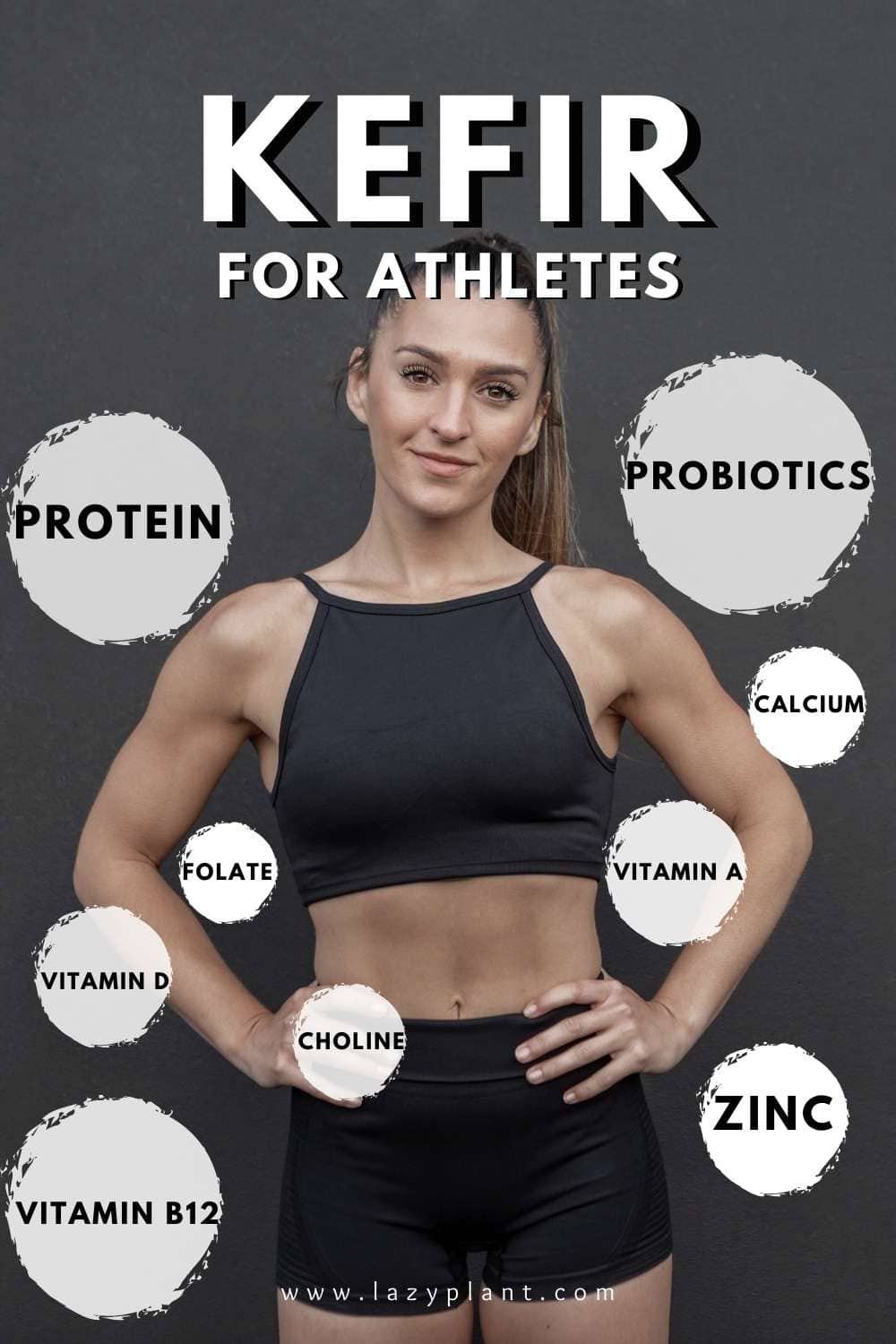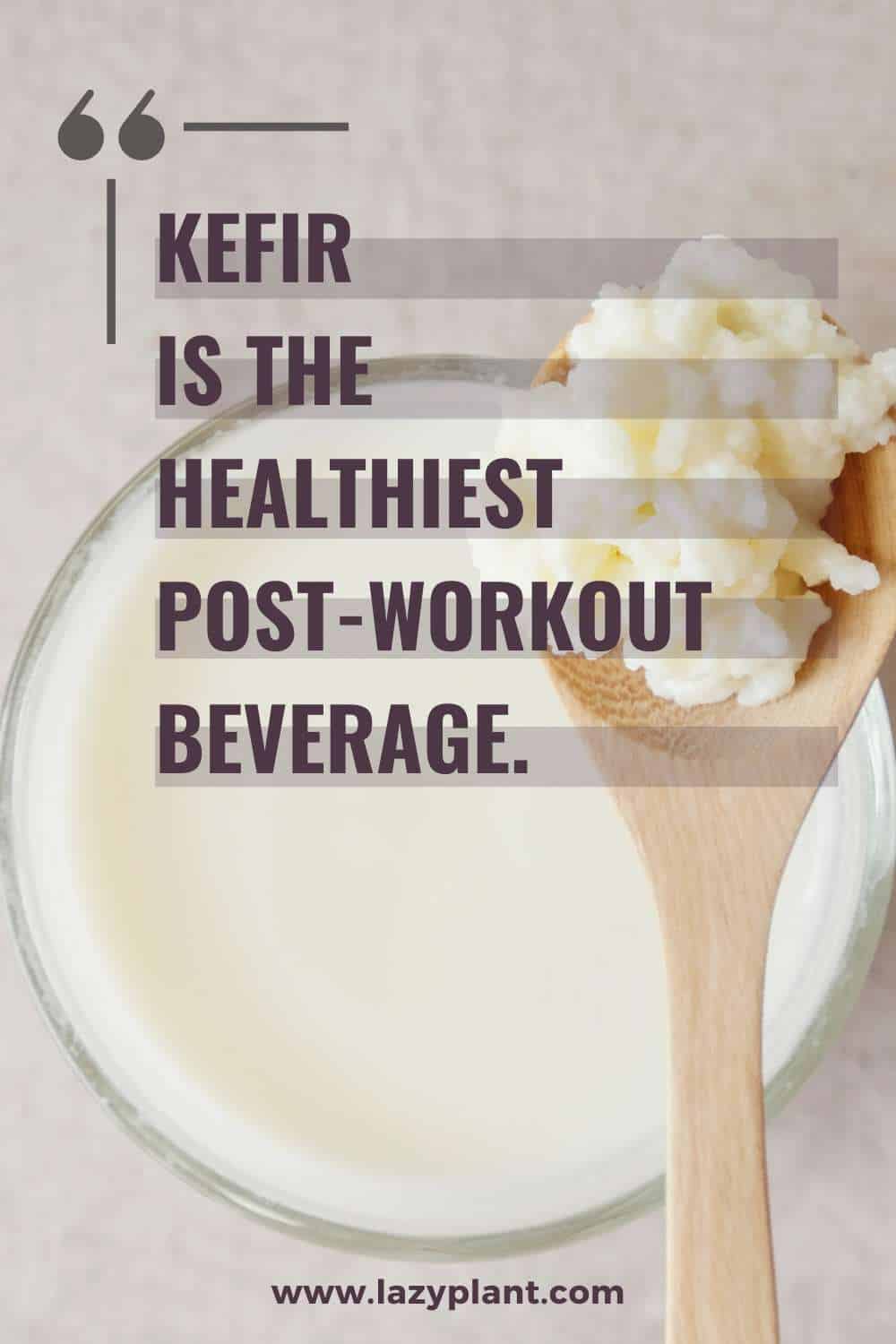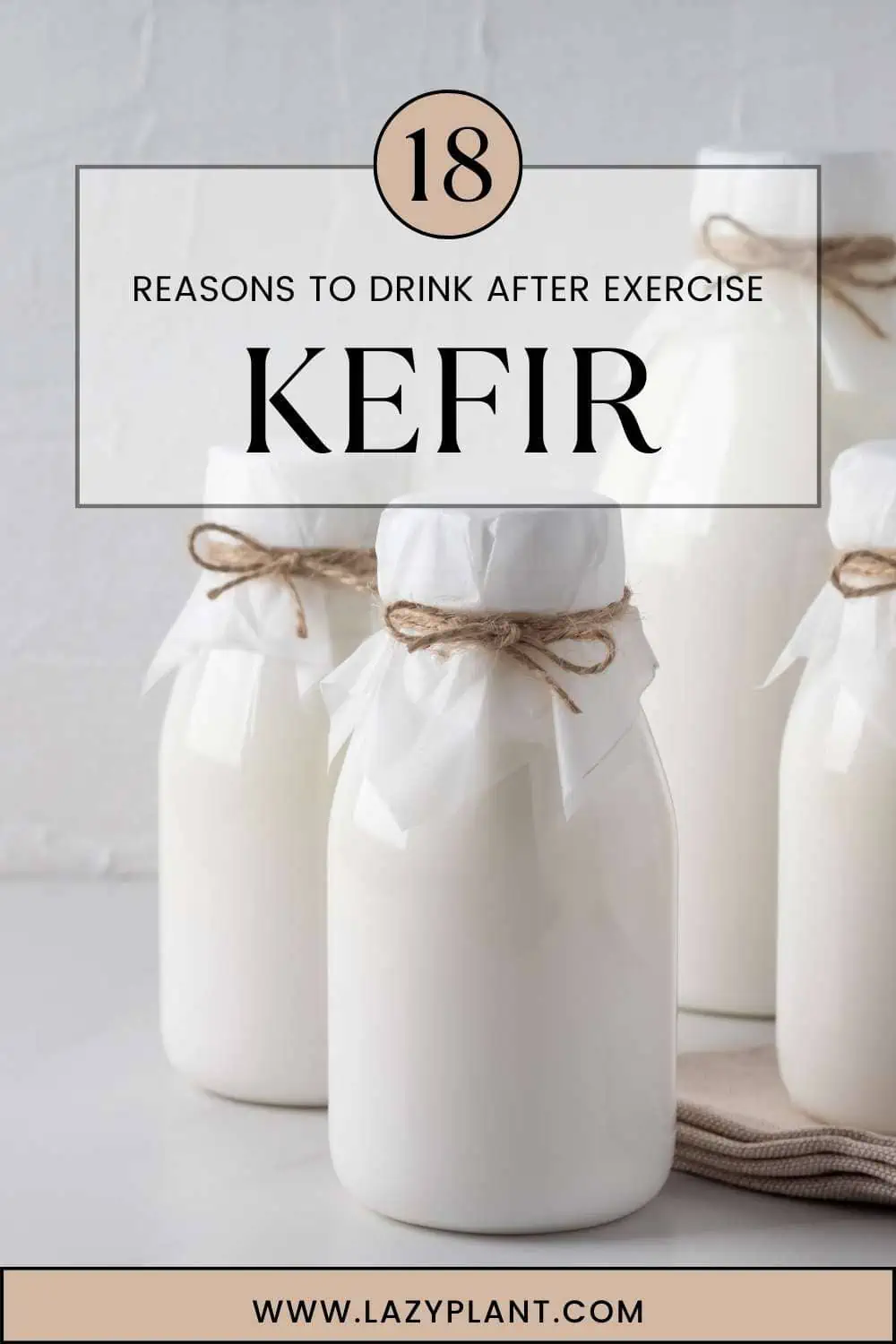Hard-exercising athletes should drink kefir because it has huge benefits for athletic performance and muscle gain. Kefir:
- is packed with protein
- increases exercise time to exhaustion
- accelerates recovery
- lowers lactate levels
- enhances energy metabolism
- increases energy levels
- prevents fatigue
- reduces the risk of infections
- hydrates the body
- strengthens the bones
- prevents future injuries
- protects the heart of athletes
What’s kefir?
Kefir is usually fermented cow’s milk. Kefir grains, which are a mix of beneficial bacteria and yeast, are added to milk.
Actually, kefir is the richest common food in probiotics. It usually contains 10-12 active probiotic strains.
Probiotics support gut health, as they support divergence and increase the population of beneficial bacteria.
Moreover, kefir is one of the best post-workout foods because it’s packed with protein, vitamins and electrolytes that are necessary for a lean body, reduced recovery time, and better athletic performance.
Benefits of kefir for runners & other endurance athletes
Probiotics
Kefir is the richest common food in probiotics. It has about 3 times more probiotic strains than yogurt. Probiotics in kefir support gut health.
Many athletes suffer from gastrointestinal problems, which limit athletic performance and affect quality of life. It’s estimated that up to 50% of athletes may have gut issues.[1]
In addition, repeated exhaustive exercise and high training loads may lead to a deteriorated immune system and increased risk of upper respiratory tract infection.
High probiotic intake could indirectly influence sports performance by improving the immune system, treating upper respiratory tract infections and decreasing exercise-induced oxidative stress![2]
Furthermore, probiotics in kefir improve sports performance, as they appear to:[3]
- increase the exercise time to exhaustion.
- lower lactate levels in the exercise and recovery.
- accelerate recovery.
In a recent study in swimmers, kefir consumption improved performance and reduced physical fatigue. Not only did kefir decrease serum lactate and ammonia, but also significantly increased glycogen content; the key energy source of hard-working muscles.[4]

Most noteworthy, kefir may protect the cardiovascular system of athletes who perform intensive endurance training. It attenuates the increase in C-reactive protein (CRP), which is a key biomarker for inflammation.[5,6]
Supports a lean body
Moreover, a healthy gut microbiota has beneficial effects on thyroid function.[7]
Thyroid hormones (e.g. T3, T4) play essential roles in regulating metabolism and energy production in the body.
In addition, thyroid hormones can influence the number of red blood cells and the oxygen-carrying capacity of the blood. They can greatly affect endurance performance. Sufficient oxygen delivery to muscle tissue is important for optimal exercise performance and muscle development.
Additionally, thyroid hormones can affect the nervous system. Overstimulation of the nervous system, often caused by excessive training, can result in fatigue and a decline in physical performance.
You could improve gut health today by taking probiotic supplements. Compare prices on iHerb; the largest platform of supplements and wellness products.
Hydrates the body
Furthermore, kefir is an excellent post-workout food because it hydrates the body better than tap water. Proper hydration is vital for a healthy body that can withstand heavy training.
We have to replenish both water and lost electrolytes after a demanding workout. Kefir is almost 90% water, and it’s packed with electrolytes:
Calcium
A cup provides 32% of the DV. Endurance athletes in particular have huge calcium losses during long training sessions or events. All athletes lose high amounts of calcium via sweat, muscle contraction, and relaxation.
Athletes who perform resistance training for muscle gain usually consume high dosages of protein. As animal protein is very acidic, calcium stored in the bones is excreted to maintain normal pH levels, weakening them.[7]
In order to protect your bones, you should increase calcium intake during periods of higher protein consumption!

Moreover, calcium stimulates muscle growth and promotes physical performance, as it modulates the production of testosterone; one of the most important anabolic hormones!
Athletes shouldn’t depend on dairy for calcium. There are various plant-based foods high in calcium, like beans.
Magnesium
Kefir contains decent amounts of magnesium as well. A serving provides 7% of the DV.
Runners and other endurance athletes require higher magnesium dosages than people who follow a sedentary life. Among others, magnesium decreases lactate production, and it’s implicated in muscle functions.
Potassium
A cup of kefir provides 12% of the DV of potassium. All tissues in the body require potassium to function properly!
Athletes in particular should maintain healthy levels because it’s involved in muscle contraction and nerve functions. Plasma potassium balance is significantly altered during and after high-intensity dynamic exercise.[8]
You can boost your daily intake by consuming beans, or a handful of mixed seeds, nuts, and dried fruits per day. These are the richest foods in potassium.
Reduces recovery time
Actually, kefir is an excellent post-workout drink because it can help athletes recover faster after strenuous exercise.
It contains vitamins and minerals involved in the process of rebuilding the damaged muscle tissue. They remove the harmful byproducts of metabolism and fight inflammation.
For instance, a cup of kefir provides 16% of the recommended daily intake of selenium. Selenium is a key component of one of the most powerful antioxidant enzymes, called glutathione peroxidase.

As selenium plays a crucial role in antioxidant defense, it improves athletic performance and training recovery.[9]
Athletes who perform high-intensity or high-volume training should be very mindful of consuming adequate amounts of selenium. It minimizes chronic exercise-induced oxidative effects.
The richest food in selenium is Brazil nuts. Just 2 nuts provide more selenium than we require per day!
The Role of Choline
Additionally, kefir is a great dietary source of choline, providing 7% of the Daily Value per serving. Choline is an essential nutrient for muscle functions.
Strenuous and prolonged physical activity can substantially decrease choline levels.[10]
Choline also improves our mood and reduces anxiety. It helps athletes stay calm before a big run or competitive event.
Eggs are the richest common foods in choline.
Why should athletes of bodybuilding drink kefir?
Vitamin A
Kefir is one of the best dietary sources of vitamin A. Just a cup provides 46% of the Daily Value (DV). Normal levels of A are necessary for muscle gain, as it’s involved in cellular growth and communication. Vitamin A supports cell growth and differentiation.
Avoid consuming high dosages from supplements, as high quantities can cause painful muscles and joints, as well as fatigue.[11]
B Vitamins
Most noteworthy, kefir is rich in B vitamins. A cup provides:
- vitamin B12, 29% DV.
- riboflavin, 25% DV.
- pantothenic acid, 19% DV.
- vitamin B6, 11% DV.
- folate, 8% DV.
- thiamine, 6% DV.
- niacin, 2% DV.
Athletes should daily consume high amounts of B vitamins, as these are water-soluble vitamins. They aren’t stored in the body.
Moreover, B vitamins are involved in energy metabolism, nerve function, oxygen transport, and many more.
Normal levels may protect the cardiovascular system. For instance, folate protects the heart, as it naturally decreases elevated plasma homocysteine levels. Intense exercise can substantially increase the levels of this amino acid. In high amounts, it can be dangerous for our health.
High riboflavin intake is particularly beneficial for runners and other endurance athletes. It might reduce muscle pain and soreness during a race. Also, it may enhance early functional recovery after a race or a demanding resistance training session.[12]

Furthermore, imbalances in B vitamins may lead to impaired athletic performance, muscle pain, or other health issues, due to oxidative stress.
Vitamin B12 is one of the most crucial vitamins for bodybuilders. It plays a key role in muscle growth and recovery.
Phosphorus
Kefir is one of the richest foods in phosphorus. A serving provides 37% of the DV. Along with calcium, phosphorus is a key compound for bone health.
In fact, hard-training athletes have much higher needs for phosphorus than the general population. Especially during the training or competition season.[13]
Moreover, a phosphorus-rich diet supports a lean body, as it regulates energy intake.
Vitamin D
Kefir is also rich in vitamin D, as a serving provides 16% of the DV.
Bodybuilders and fitness enthusiasts who work out for a lean body, as well as endurance athletes, should be very cautious with vitamin D status, as it:[14]
- supports muscle gain
- influences sports performance
- modulates injury recovery
- prevents future injuries
- reduces the risk of infections
Probiotics in kefir or supplements increase vitamin D intestinal absorption.[15]
Zinc
Furthermore, bodybuilders and other athletes who work out for muscle hypertrophy and strength benefit from kefir consumption because it’s rich in zinc. A serving provides 10% of the DV.
Zinc is involved in skeletal muscle synthesis and the regeneration process that takes part after exercise. Actually, one in every ten human proteins is a zinc protein.[16]
Athletes have increased zinc needs.
Should I drink kefir before a workout?
Athletes can consume kefir a couple of hours before exercise. It provides steady energy levels during exercise.
Unsweetened kefir has only 11 grams, while flavored kefir has approximately 22 grams of sugar per serving.
It’s crucial to drink kefir at least two hours before exercising. Otherwise, athletes may feel bloating, stomach pain, gas, or other stomach discomfort.
Fat in milk takes time to digest. Even low-fat kefir has about 2.4 grams of fat.
You could drink kefir in the morning for weight loss and better immunity, or at dinner for a good night’s sleep!
How much kefir should athletes drink?
As a rule of thumb, a cup of kefir a day is more than enough. It’s ideal for the general population or athletes who want a lean body.
A cup of low-fat unsweetened kefir has about 105 calories, while a cup of flavored kefir can have 150 calories!
Certainly, athletes who have increased energy needs, like long-distance runners or bodybuilders in the bulking phase, can consume much higher amounts. Even 3 cups of kefir a day contain fewer than 450 calories!
If you have a sensitive stomach or experience side effects after drinking kefir, you better drink smaller dosages. Even 1/4 cup of kefir a day, as part of a fiber-rich, balanced diet, can greatly improve your gut health. You can gradually increase your daily intake.
Can athletes with diabetes or athletes on keto drink kefir?
Yes, people with diabetes can drink unsweetened kefir. In fact, kefir is a good dietetic beverage.[17]
Athletes on keto can consume reasonable amounts as well. 1/2 cup of kefir without added sugar contains less than 6 grams of sugar.
Is kefir a better post-workout snack than yogurt?
Plain Greek yogurt is also great post-workout food. It can have more than 9 grams of protein per 100g! Eat yogurt with oats for weight loss, and maximizing health benefits. Their combination makes a super nutrient-dense food.
Yogurt has some probiotics as well. But, kefir is a better source, containing 3 times more probiotic strains.
So, both yogurt and kefir are functional foods for athletes and fitness enthusiasts who exercise for a lean body.
How to drink kefir after exercise?
Certainly, you can drink kefir right after the gym as the first post-workout snack.
Moreover, you could add it to oatmeal, granola, or corn flakes, instead of milk. All these cereals have huge benefits for muscle growth and athletic performance.
Additionally, you could add kefir to your favorite post-workout smoothies.
Always consult your healthcare provider before changing your diet routine or taking dietary supplements.